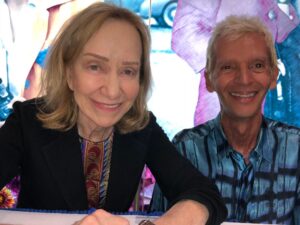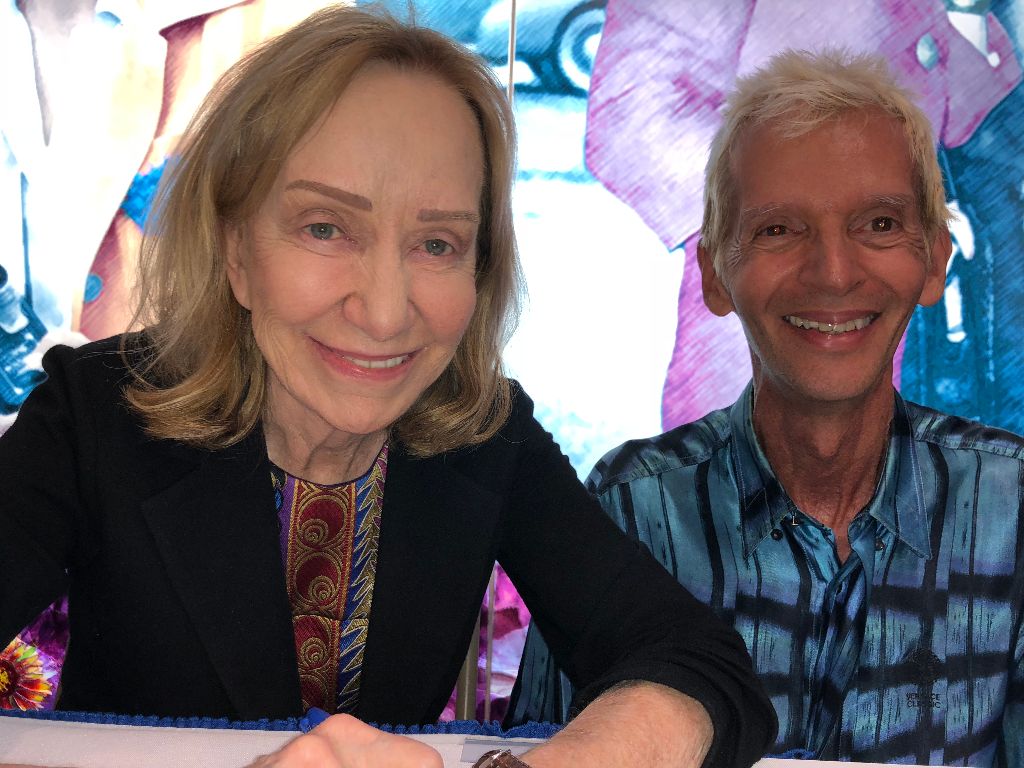The Briscoe Center for American History in Austin is about to become the home to collected archives of Doris Kearns Goodwin, and her late husband Richard Goodwin (1931-2018).
Richard Goodwin’s “American Promise” speech for Pres. Lyndon Johnson, was a plea for the Voting Rights Act in the wake of Bloody Sunday in Selma, Alabama. It spurred immediate action from Congress, and ranks as one of the most eloquent, effective and under-rated presidential speeches in history. The combination of the archives at the LBJ Library and the Briscoe Centre make Austin a mecca for the study of the 1960s.
Doris Goodwin described her husband’s legacy and the scope of what his papers cover, which include memorabilia, menus, newspaper and magazine articles, memos with presidential writings on them, and his comments on everything.
“What’s so amazing about my late husband,” Doris said during a conversation held at the LBJ Library in September, “is that he saved everything over many years. There were 350 boxes that travelled with us everywhere we went. He was in the right place at the right time. Some people have said he was the zealot of the 1960s – the Forrest Gump of the 1960s – he just pops up wherever you want him to pop up. Starting in 1950s he was at Harvard Law School, then he was involved in segregation cases, and he was the one who investigated the rigged quiz shows on television. As a young kid he got to work with Pres. Kennedy as a second speech writer under Ted Sorensen.”
After working at the State Department, he went to the Peace Corps. “He was going to return to the White House as a special consultant on the arts. He has a diary of going to the White House right after the assassination and being there in the middle of all the planning for the eternal flame, how the body would be laid out, etc. An extraordinary account. Then he becomes Lyndon Johnson’s chief speech writer.” Doris said Robert Kennedy was her husband’s best friend and was with him when he died in 1968, and Richard working with Jackie Kennedy on a series of projects when she was in the White House: so he knows all of those characters in the 60s. These papers allow you to time travel through this rollercoaster of a decade, which had extraordinary triumphs and extraordinary sadness.”
She described Presidents Kennedy and Johnson as “two halves of a whole,” so these archives will be of interest to scholars of both Administrations. Doris also worked for Pres. Johnson, “despite having written an article against him. He hired me anyway, saying ‘Bring her down for a year. If I can’t win her over, no one can.’” Doris said LBJ “took me into his family, I stayed at the ranch and mostly just listened to him talk, talk, talk. He never really stopped! He said ‘You remind me of my Mother.’”
Doris was joined on stage by Don Carleton of the Briscoe Center. “This whole collection couldn’t fit better in terms of our mission. This is a rich collection for original research but also for teaching purposes. It also fits very well with work we’ve done for several years, which is bringing in collections that relate to Dick Goodwin’s career. One of our star collections is the Walter Cronkite archive, who embodies the 60s. We also have civil rights leader James Farmer’s archive and a huge photographic archive of nearly 9 million images, including the largest collection of images of Martin Luther King in existence in one place.”
When he became aware of Doris’ interest in donating her husband’s papers, Carleton flew to Boston to meet her. “I was like a little boy going through a collection od baseball cards,” he enthused. “Thank God for pack rats! This is what saves history.” Then he said to Doris, “We want your archives too. You’re a significant cultural figure in this country and a significant public intellectual.”
Doris explained that her papers being donated “is about the research I’ve done for all the books I have written. I kept every piece if research. People can find the whole process of writing a book.”
Visitors to the Briscoe Center at 2300 Red River Street in Austin can already see some highlights from the Goodwin collection as they have a 3,000 square foot gallery to show off the treasures. The full collection will reach the archives in April 2023.
Visit: www.briscoecenter.org
About Doris Kearns Goodwin:
Doris Kearns Goodwin is a renowned presidential historian and Pulitzer Prize-winning, New York Times #1 best-selling author. She is best known as a preeminent public intellectual, presidential historian, and biographer frequently seen on television putting today’s news into historical context.
Her first book, Lyndon Johnson and the American Dream, became a national bestseller and achieved critical acclaim. She was awarded the Pulitzer Prize for No Ordinary Time: Franklin and Eleanor Roosevelt: The Home Front in World War II. Her bestselling book The Fitzgeralds and the Kennedys was adapted into an award-winning five-part television miniseries. The Bully Pulpit: Theodore Roosevelt, William Howard Taft and the Golden Age of Journalism was awarded the Carnegie Medal.
Doris earned the Lincoln Prize for Team of Rivals: The Political Genius of Abraham Lincoln, which provided the basis for Steven Spielberg’s Academy Award-winning film Lincoln, starring Daniel Day-Lewis. Her most recent title, Leadership in Turbulent Times, incorporates her five decades of scholarship studying Presidents Abraham Lincoln, Theodore Roosevelt, Franklin Roosevelt and Lyndon Baines Johnson.
About Don Carleton:
Don Carleton is the executive director of the Dolph Briscoe Center for American History and J. R. Parten Chair in the Archives of American History at the University of Texas at Austin. He is the author of twelve books, including The Governor and the Colonel: A Dual Biography of William P. Hobby and Oveta Culp Hobby, Red Scare, A Breed So Rare, and Conversations with Cronkite. He is also the executive producer of two PBS documentaries: When I Rise (2010) and Cactus Jack: Lone Star on Capitol Hill (2016). In 2015, the Texas Democracy Foundation honored him with its Bernard Rapoport Award.

